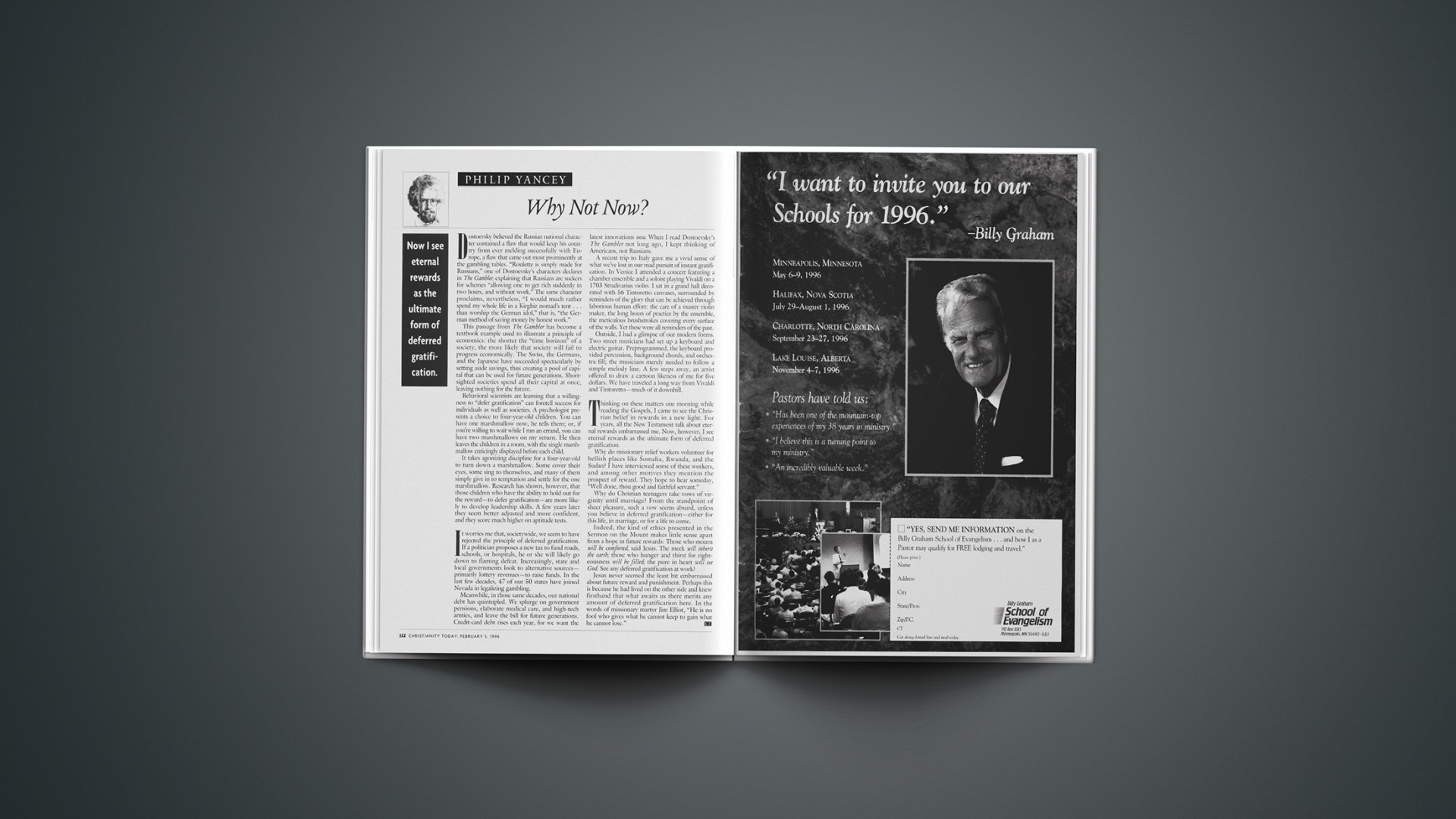Dostoevsky believed the Russian national character contained a flaw that would keep his country from ever melding successfully with Europe, a flaw that came out most prominently at the gambling tables. “Roulette is simply made for Russians,” one of Dostoevsky’s characters declares in The Gambler, explaining that Russians are suckers for schemes “allowing one to get rich suddenly in two hours, and without work.” The same character proclaims, nevertheless, “I would much rather spend my whole life in a Kirghiz nomad’s tent . . . than worship the German idol,” that is, “the German method of saving money by honest work.”
This passage from The Gambler has become a textbook example used to illustrate a principle of economics: the shorter the “time horizon” of a society, the more likely that society will fail to progress economically. The Swiss, the Germans, and the Japanese have succeeded spectacularly by setting aside savings, thus creating a pool of capital that can be used for future generations. Short-sighted societies spend all their capital at once, leaving nothing for the future.
Behavioral scientists are learning that a willingness to “defer gratification” can foretell success for individuals as well as societies. A psychologist presents a choice to four-year-old children. You can have one marshmallow now, he tells them; or, if you’re willing to wait while I run an errand, you can have two marshmallows on my return. He then leaves the children in a room, with the single marshmallow enticingly displayed before each child.
It takes agonizing discipline for a four-year-old to turn down a marshmallow. Some cover their eyes, some sing to themselves, and many of them simply give in to temptation and settle for the one marshmallow. Research has shown, however, that those children who have the ability to hold out for the reward–to defer gratification–are more likely to develop leadership skills. A few years later they seem better adjusted and more confident, and they score much higher on aptitude tests.
It worries me that, societywide, we seem to have rejected the principle of deferred gratification. If a politician proposes a new tax to fund roads, schools, or hospitals, he or she will likely go down to flaming defeat. Increasingly, state and local governments look to alternative sources–primarily lottery revenues–to raise funds. In the last few decades, 47 of our 50 states have joined Nevada in legalizing gambling.
Meanwhile, in those same decades, our national debt has quintupled. We splurge on government pensions, elaborate medical care, and high-tech armies, and leave the bill for future generations. Credit-card debt rises each year, for we want the latest innovations now. When I read Dostoevsky’s The Gambler not long ago, I kept thinking of Americans, not Russians.
A recent trip to Italy gave me a vivid sense of what we’ve lost in our mad pursuit of instant gratification. In Venice I attended a concert featuring a chamber ensemble and a soloist playing Vivaldi on a 1703 Stradivarius violin. I sat in a grand hall decorated with 56 Tintoretto canvases, surrounded by reminders of the glory that can be achieved through laborious human effort: the care of a master violin maker, the long hours of practice by the ensemble, the meticulous brushstrokes covering every surface of the walls. Yet these were all reminders of the past.
Outside, I had a glimpse of our modern forms. Two street musicians had set up a keyboard and electric guitar. Preprogrammed, the keyboard provided percussion, background chords, and orchestra fill; the musicians merely needed to follow a simple melody line. A few steps away, an artist offered to draw a cartoon likeness of me for five dollars. We have traveled a long way from Vivaldi and Tintoretto–much of it downhill.
Thinking on these matters one morning while reading the Gospels, I came to see the Christian belief in rewards in a new light. For years, all the New Testament talk about eternal rewards embarrassed me. Now, however, I see eternal rewards as the ultimate form of deferred gratification.
Why do missionary relief workers volunteer for hellish places like Somalia, Rwanda, and the Sudan? I have interviewed some of these workers, and among other motives they mention the prospect of reward. They hope to hear someday, “Well done, thou good and faithful servant.”
Why do Christian teenagers take vows of virginity until marriage? From the standpoint of sheer pleasure, such a vow seems absurd, unless you believe in deferred gratification–either for this life, in marriage, or for a life to come.
Indeed, the kind of ethics presented in the Sermon on the Mount makes little sense apart from a hope in future rewards: Those who mourn will be comforted, said Jesus. The meek will inherit the earth; those who hunger and thirst for righteousness will be filled; the pure in heart will see God. See any deferred gratification at work?
Jesus never seemed the least bit embarrassed about future reward and punishment. Perhaps this is because he had lived on the other side and knew firsthand that what awaits us there merits any amount of deferred gratification here. In the words of missionary martyr Jim Elliot, “He is no fool who gives what he cannot keep to gain what he cannot lose.”
Copyright © 1996 Christianity Today. Click for reprint information.










